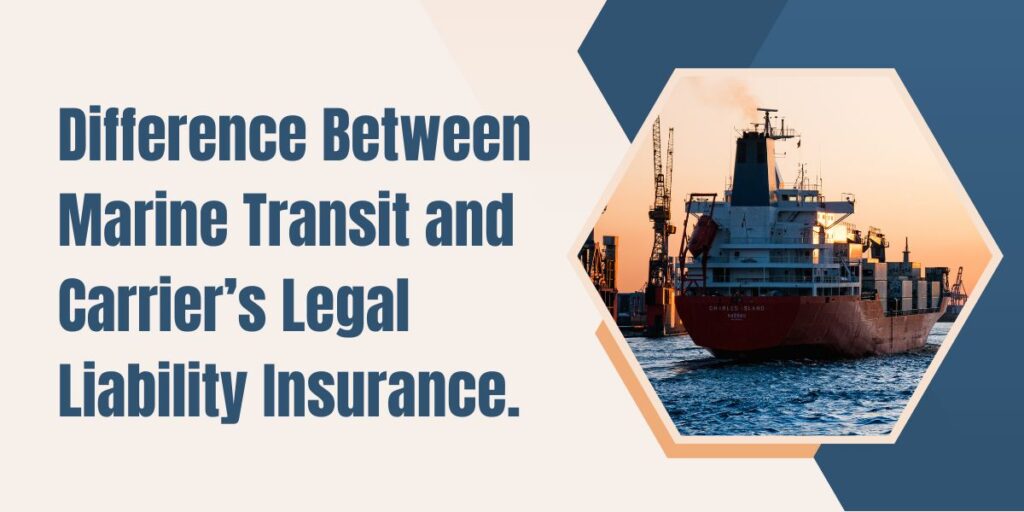Difference Between Marine Transit Insurance and Carrier’s Legal Liability Insurance in India
In the shipping and transportation industries, two key insurance types provide essential protection: Marine Insurance and Carrier’s Legal Liability Insurance. Although related, these policies safeguard different parties and risks. Understanding their distinctions is vital for effective risk management in India’s maritime and transport sectors.
Marine Insurance
- Definition
Marine insurance is a specialized coverage designed to protect cargo owners’ and shippers’ financial interests against damage, loss, or theft of goods and vessels during transit by sea, air, or land.
- Coverage Focus
Protects the insured cargo and vessel, compensating cargo owners and shippers for losses caused by unexpected events during transportation.
- Parties Involved
Mainly cargo owners (importers/exporters) and shippers (consignors/consignees).
- Scope of Coverage
Includes risks such as:
- Natural calamities (storms, floods)
- Fire and explosions
- Theft or pilferage
- Riots, strikes, malicious damage
- Delay due to insured perils
- Legal Requirements
Not legally mandated in India, but strongly recommended especially for international trade due to contractual obligations like Incoterms.
- Key Features
- Voyage Policies: Cover specific shipments
- Open Policies: Continuous coverage for multiple shipments over a defined period
- Customizable coverage based on cargo value, routes, and needs
- Use of surveyors and adjusters in claims to assess damages and compensation
_____________________________________________________________________________________
Carrier’s Legal Liability Insurance
- Definition
Carrier’s Legal Liability (CLL) insurance protects carriers (shipping companies and transport operators) against legal liabilities arising from cargo damage, loss, or delay during transit.
- Coverage Focus
Covers legal claims and losses the carrier may face from cargo owners due to damage, loss, or delay, including defense costs related to such claims.
- Parties Involved
Carriers or transport operators responsible for transporting goods.
- Scope of Coverage
Includes:
- Legal liability for cargo damage or loss
- Defense costs for legal claims
- Liability for delayed delivery
- Legal Requirements
Often a legal requirement in India for carriers to operate, aimed at protecting cargo owners’ interests and ensuring carriers meet obligations.
- Key Features
- Mandatory coverage with defined limits and conditions
- Legal defense cost coverage
- Third-party liability coverage (e.g., for damage to other vessels or property)
Key Differences Between Marine Insurance and Carrier’s Legal Liability Insurance
| Aspect | Marine Insurance | Carrier’s Legal Liability Insurance |
| Primary Focus | Protects cargo owners and shippers’ goods | Protects carriers legally liable for cargo liabilities |
| Parties Insured | Cargo owners, shippers | Carriers, transport operators |
| Coverage Scope | Covers cargo damage, loss, theft, delays | Covers carrier’s legal liabilities and defense costs |
| Legal Requirement | Not mandatory but often contractually required | Often mandated for carriers in India |
| Customizability | Highly customizable by cargo and route | Generally standard with mandated coverage |
| Claims Handling | Surveyors assess cargo damage and losses | Focus on legal claim defense and liability payments |
Conclusion
Both marine insurance and carrier’s legal liability insurance are crucial for risk management in shipping and transportation. Marine insurance safeguards the financial interests of cargo owners and shippers, while carrier’s legal liability insurance protects carriers against legal claims for cargo damage or loss. Understanding these distinctions helps stakeholders ensure comprehensive coverage and smooth goods movement in India’s maritime and transport sectors.


